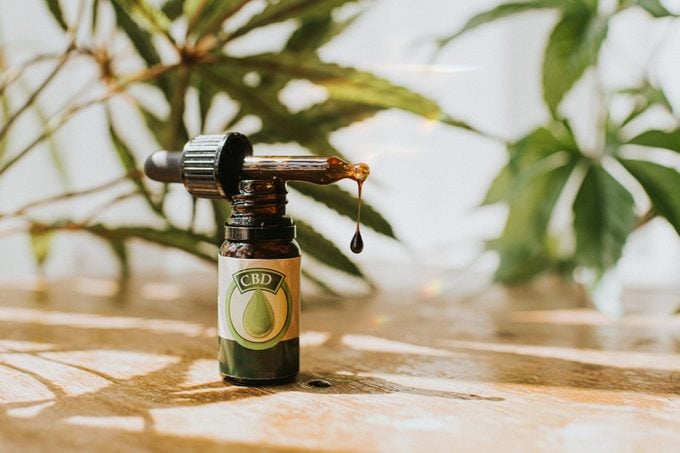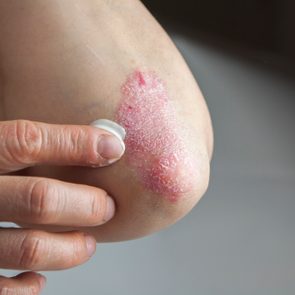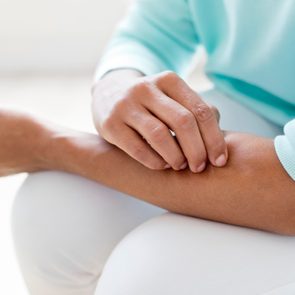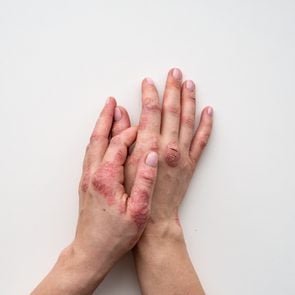Does CBD Help Psoriasis? Here’s What Experts Say
Updated: Jun. 11, 2021
CBD oil is widely touted for its health benefits, and when it comes to psoriasis, there are reasons to be optimistic.
Can CBD provide psoriasis relief?
There’s a slim chance you’ve made it all the way to 2021 without hearing someone extol the benefits of cannabidiol—CBD.
Fans claim it can do everything from relieve stress and anxiety to improve chronic pain, lessen depression, ease arthritis, and improve epilepsy.
Psoriasis relief may make the list of potential health benefits.
But can CBD oils or other products really provide much-needed itch and pain relief? Can it help clear up psoriasis plaques?
The short, and somewhat unsatisfying answer is maybe.
But more research is needed before any recommendations can be made, says Adam Friedman, MD, professor and chair of dermatology at George Washington School of Medicine and Health Sciences in Washington, D.C.
What is psoriasis?
Affecting as many as eight million people in the United States, psoriasis is an inflammatory skin condition that occurs when your immune system cranks up the production of skin cells.
Instead of shedding, these cells build up on top of your skin, forming raised, reddened plaques covered with silvery scales. These plaques may itch or sting.
Psoriasis can show up anywhere on your body, but it is most commonly seen on the lower back, elbows, knees, legs, soles of the feet or palms, and scalp.
And it’s more than just a skin condition and a nuisance.
About 30 percent of people with psoriasis also develop joint pain, inflammation, and limited mobility that are associated with psoriatic arthritis, according to the National Psoriasis Foundation. Your likelihood of developing psoriatic arthritis is even higher if you have scalp psoriasis.
What’s more, the underlying inflammation of psoriasis is linked to a higher risk for heart disease and diabetes.
Psoriasis can also damage self-esteem and take a heavy toll on your quality of life if left untreated.
What is CBD?
CBD comes from the Cannabis sativa plant.
Both marijuana and its cousin, hemp, are cannabis plants, and both contain CBD. But there’s a big difference between the two.
Marijuana has a higher concentration of THC, or delta-9 tetrahydrocannabinol, which is the ingredient that gets you high.
Some CBD products can also get you high, they don’t always. That depends on whether the product comes from hemp or marijuana and whether it contains enough THC. Check out more about CBD vs. THC.
How do you take CBD?
CBD comes in a variety of forms, and products containing it seem to grow by the day. Generally speaking, you’ll find CBD as the following products:

CBD oil and psoriasis: What’s the connection?
THC and CBD interact with endocannabinoid receptors throughout your body in specific tissues or the nervous system.
This interaction may result in reduced inflammation, itching, pain relief, better sleep, and decreased anxiety, explains Jason E. Hawkes, MD, an associate clinical professor of dermatology at UC Davis Health in Rocklin, California.
Downside: not nearly enough research
There aren’t many high-quality studies looking at CBD in people with psoriasis or other skin conditions. The studies we do have were conducted in lab cells or animals. Those may be encouraging, but they’re just a start.
As such, experts can’t say with any degree of certainty that it can help.
Updside: CBD shows potential for psoriasis
There is reason for optimism, says Dr. Friedman.
“There’s a lot of hype that is sadly built around limited evidence, but from a purely biological standpoint, it does make sense that CBD oil can improve psoriasis symptoms,” he says.
Studies in skin cells have shown that endocannabinoids like CBD can inhibit the inflammation that initiates and precipitates a psoriasis flare, he says.
“Preclinical studies in cells or animals suggest that CBD can affect key immune pathways, such as T helper-17, which seems to be central to the inflammation of psoriasis,” says Dr. Friedman.
One study of 20 people, including five who had psoriasis, found that applying a CBD-enriched ointment to the affected skin twice daily for three months significantly improved psoriasis symptoms.
What’s more, there were no irritant or allergic reactions seen during the treatment period. The study appears in a 2019 issue of Clinical Therapeutics.
The big question is whether the CBD made any difference at all. It’s possible the improvement came from the use of the ointment.
“Simply moisturizing your skin can soften the really thick layer of skin in psoriasis, and that alone can have some benefit,” Dr. Friedman says.
CBD is often combined with other ingredients that target pain, irritation, or itching, like camphor. And it may have salicylic acid, which breaks down thick, scaly skin and could enhance the effects of a moisturizing agent.
Adapting CBD for psoriasis
“There is a decent amount of preclinical evidence that if we get CBD where it needs to be, it will work,” Dr. Friedman says.
But that’s easier said than done. One way to accomplish it is to shrink the CBD particles down to the nano level so they can more easily pass through the skin. A nanometer is one-billionth of a meter.
There are many other factors that would need to be studied, too. After all, researchers don’t yet know whether a cream applied to the skin might help psoriasis more than a swallowed capsule—or if the CBD in gummies will have any effect at all.
Scientists need to study disease severity, strain-specific compounds, concentration and dosing, method of delivery, and treatment duration, says Dr. Hawkes.
“We need studies looking at dosage and CBD concentration as well as drug interaction and allergy or irritation concerns in ingredients,” says Mark Moyad, MD, MPH, the Jenkins/Pokempner Director of Preventive & Alternative Medicine at the University of Michigan Medical Center in Ann Arbor.
CBD oil vs. steroids for psoriasis
Topical steroids are a common treatment for psoriasis.
“Steroids tell your immune cells to self-destruct, but cannabinoids like CBD aren’t so focused on blocking or killing these cells,” Dr. Friedman says.
Instead, CBD aims to resolve inflammation.
“In theory, CBD binds to receptors on immune cells and instructs these cells to stop secreting pro-inflammatory cytokines and start rebuilding,” he explains.
While there are a number of highly effective and safe topical and systemic treatments for psoriasis, many people still live with chronic itching, pain, and the stigma and psychosocial consequences of having a highly visible skin condition, says Dr. Hawkes.
“It is, therefore, not surprising that patients affected with psoriatic disease have sought relief from their disease via a variety of adjunctive treatment options, including cannabis-based products like CBD,” he says.
That said, he stresses that CBD should never be used in place of other psoriasis treatments recommended by your doctor. If you do use it, it’s simply an add on to the rest of your therapy.
Is CBD legal?
The CBD industry may be here to stay, but it wasn’t always so booming. In the past few years, demand grew, and supply ballooned.
Credit goes to the 2018 Farm Bill, which removed hemp and its derivatives with low THC from the Controlled Substances Act (CSA), which is where THC currently remains.
That means farmers can legally cultivate hemp and companies can legally produce hemp products—including those with CBD—as long as they contain no more than 0.3 percent THC.
It’s always a good idea to see what’s legal in your state. (The National Conference of State Legislatures keeps a running tally of where medical marijuana is legal.) Some states restrict buying hemp-based CBD products.
How to shop for CBD
There’s no shortage of places to buy CBD products, both online and in person.
But Dr. Friedman cautions that there’s minimal oversight. And that means it’s buyer beware.
“There is no way to tell for sure what you are getting,” he says.
CBD products vary widely in their concentrations, with nearly half having lower concentrations of CBD than stated on the labels, according to research in a 2017 issue of JAMA.
And some over-the-counter CBD products have impurities that can cause allergic dermatitis, found a 2020 study in Clinical Toxicology.
If you’re set on trying CBD, shop around before purchasing. There are steps you can take to make sure you get the safest and most accurate CBD product possible.
Ask for a certificate
Your best bet is to go directly to a company website and ask for the certificate of analysis (COA). This document provides results of any and all testing of the supplements.
Check for reputable vendors in your state
In states where marijuana is legal for medicinal or recreational purposes, the state health department may keep a list of reputable vendors.
State-licensed dispensaries may have higher-quality products than random over-the-counter brands because there is some oversight coming from the state’s Department of Health, Dr. Friedman says.
Read the ingredient list
“Look for transparent ingredient lists and a good brand reputation, and have open conversations with health care providers [to] best navigate this rapidly evolving cannabis landscape,” Dr. Hawkes advises.
Talk to patient organizations
Some patient advocate associations for psoriasis may have helpful resources for you.
“For psoriasis patients specifically, I also recommend that they seek out additional resources from established medical organizations and patient advocacy groups that may help them make informed decisions, such as the National Psoriasis Foundation, which is currently working to put out psoriasis guidelines related to cannabis use in the setting of psoriatic disease,” he adds.
First, do no harm
The potential risks of CBD and other cannabis-derived products in people with psoriasis and other inflammatory skin diseases hasn’t been carefully studied, Dr. Hawkes stresses.
“The small number of clinical studies that have been conducted for non-psoriasis conditions are informative and suggest that potential risks should be considered, especially in patients with psoriatic disease,” he says.
For example, people with psoriasis are at increased risk for joint inflammation, heart disease, stroke, obesity, diabetes, liver disease, inflammatory bowel disease, sleep disorders, depression, and anxiety.
“In several studies, systemic CBD and other cannabis-derived products were associated with worsening cardiovascular disease, obesity, and diabetes, fatty liver disease, or higher likelihood of surgery for the treatment of inflammatory bowel disease,” Dr. Hawkes says.
People with psoriasis need to be aware of the potential worsening of those underlying conditions with systemic cannabis products.
“Potential adverse events are also more likely with systemic or high-dose administration compared to other delivery methods, such as limited or topical applications of CBD oil,” he says.
Should you try CBD for psoriasis?
Considering the lack of evidence, is CBD worth a try if you have psoriasis?
“For psoriasis patients with specific complaints, such as pain, itching, or trouble sleeping, cannabis-derived products could help reduce the negative impact these symptoms have on their life,” Dr. Hawkes says.
But if you’re going to use CBD, choose a reputable brand and let your doctor know about anything that you are using to help with your psoriasis symptoms. And remember: never replace your tried-and-true psoriasis treatments with CBD.
Not ready to jump on the CBD bandwagon just yet? It’s OK to wait it out. The medical community is taking notice of CBD, conducting more studies that aim to get to the bottom of its uses.
“As a medical community, we are going to have to think creatively about ways to evaluate and determine the safety and effectiveness of CBD products for specific medical conditions,” Dr. Hawkes says.
And the clock is ticking. “We all have to advance our understanding of CBD and other cannabinoid derivates because the cannabis product industry is here to stay,” he adds.


















